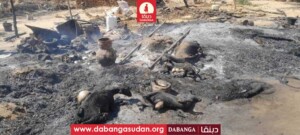Peace talks: Rebels, Sudan govt agree to include displaced, refugees in Darfur track
The Sudan Revolutionary Front signed a protocol with the Sudanese government on Monday for the participation of the displaced, refugees, and civil society in the Juba talks. A peace conference will be held by stakeholders in the east of Sudan to resolve their differences.
 Darfuri children in Touloum refugee camp in eastern Chad (file photo)
Darfuri children in Touloum refugee camp in eastern Chad (file photo)
The Sudan Revolutionary Front (SRF) alliance of armed movements signed a protocol with the government of Sudan on Monday for the participation of the displaced, refugees, and civil society members in the Juba talks. Negotiation sessions on the eastern Sudan track have been suspended for a period of three weeks to allow for a separate peace conference to be held by stakeholders in the east of Sudan to resolve their differences.
The deal inclusivity follows repeated demands by leaders of the displaced and refugees to have their issues heard. The agreement aims to involve all stakeholders and allow them to state their demands and wishes in a non-political environment of inclusiveness and transparency.
El Hadi Idris, head of the SRF, told Radio Dabanga that the protocol provides for holding three conferences for the displaced, refugees, and civil society, in preparation for their participation in the Juba negotiations.
Joint field committee
Idris explained that the two parties agreed to negotiate the formation of a joint field committee between the government and the SRF consisting of 24 members, including 16 representatives of the SRF and eight of the government.
He said that the joint field committee is concerned with supervising two consultative conferences in El Fasher to choose representatives to participate in the Juba negotiations. The civil society conference will be held on January 5 and the displaced conference will occur on January 10.The committee will also supervise a refugee workshop in Chad with the participation of refugees in several countries.
The protocol called on the joint committee to consult the displaced in the issues to be presented at the conference, taking into account the population density, and the representation of the displaced in the states.
50 per cent women
The protocol stipulated that 200 displaced will participate in the El Fasher conference on January 10, provided that women shall be represented by 50 per cent, and 50 of them are chosen, equally between men and women to come to Juba in conjunction with the presence of the displaced from El Fasher.
The two parties also demanded a commitment to represent refugees in other African countries such as Egypt, Uganda, Ethiopia, the Central African Republic, Niger, and Ghana.
Regarding the civil society conference on January 5, the protocol stipulates that it be under the supervision of the joint field committee between the government, the SRF, the UN-AU Mission in Darfur (Unamid) and the Supreme Peace Commission, with the participation of 200 civil society representatives, including 100 from the native administration, 32 from civil society organisations, 28 professionals, 40 herders and farmers. From the four categories, 50 representatives are to be selected to attend the Juba peace talks for a period of four days.
Idris said that the joint committee would move to Khartoum on Monday and from there to Darfur to start preparing for the conference by going to all camps and explaining the nature of the Juba negotiations.
Eastern Sudan track suspended
Negotiation sessions on the eastern Sudan track have been suspended for a period of three weeks to allow for a separate peace conference to be held by stakeholders in the east of Sudan to resolve their differences.
The South Sudanese mediation announced the lifting of the negotiation sessions on the eastern Sudan track for a period of three weeks to allow the opportunity to hold a conference for the components of the east inside Sudan to resolve their differences and then return to the Juba platform to resume negotiations.
Idris told Radio Dabanga that the decision to suspend the negotiations came in consultation between the negotiating and mediation parties.
Tut Galuak, head of the South Sudanese mediation team, announced that he had received a paper for study and consultation. He pointed out that the official opening session of the eastern Sudan track was to be held yesterday by presenting the framework agreement paper to the government delegation, provided that the response will be made by the government after the resumption of negotiations after three weeks.
Eastern Sudanese leader Osama Saeed said that their negotiating position is based on three political, economic, and security files.
Hemeti meets SPLM-N El Hilu
Deputy Chairman of the Sovereign Council, Lt Gen Mohamed Hamdan ‘Hemeti’ said that Sudan is currently going through a turning point that requires uniting everyone, stressing that “the Sudanese people will be the guarantor of the agreement expected to be signed with the armed movements in Juba”.
He said that peace is inevitably coming, stressing the need for all to unite in order to achieve the desired peace.
Hemeti described his meeting with the Sudan People’s Liberation Movement-North faction under the leadership of Abdelaziz El Hilu in Juba as “a good meeting through which we broke the barriers of isolation that existed between us,” and added that “Abdelaziz El Hilu is a virtuous man who only had bitter experiences”.
He sent a special message to Abdelwahid El Nour, the leader of the mainstream Sudan Liberation Movement, in which he called for the necessity of joining the peace negotiations in Juba.
Agadez refugee sit-in
The sit-in of Sudanese refugees in front of the headquarters of the United Nations High Commissioner for Refugees (UNHCR) in Agadez in Niger entered its second week, amid bad humanitarian conditions of severe cold and a lack of food and water.
The refugees denounced the UNHCR’s neglect of their demands to complete resettlement procedures after they left Agadez camp because of the lack of the basic necessities of life.
Refugee Abdelaziz Juma told Radio Dabanga that we call on the international community to look at their conditions, adjust their status and complete their resettlement procedures.
He explained that most of the refugees come from Darfur, the Nuba Mountains, and Blue Nile state.
Radio Dabanga’s editorial independence means that we can continue to provide factual updates about political developments to Sudanese and international actors, educate people about how to avoid outbreaks of infectious diseases, and provide a window to the world for those in all corners of Sudan. Support Radio Dabanga for as little as €2.50, the equivalent of a cup of coffee.












 and then
and then